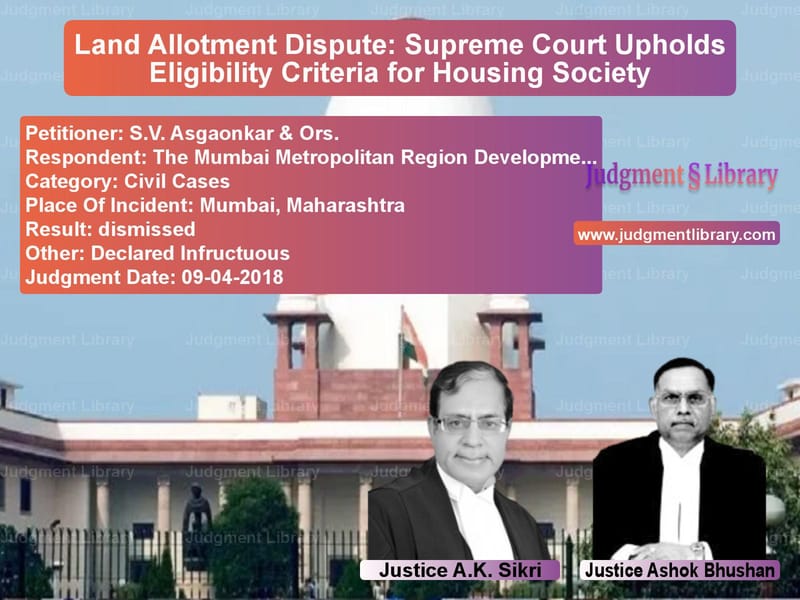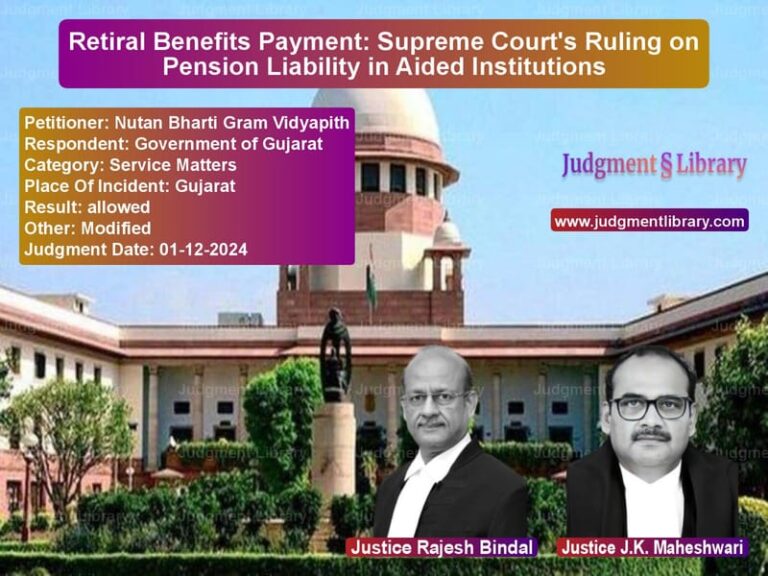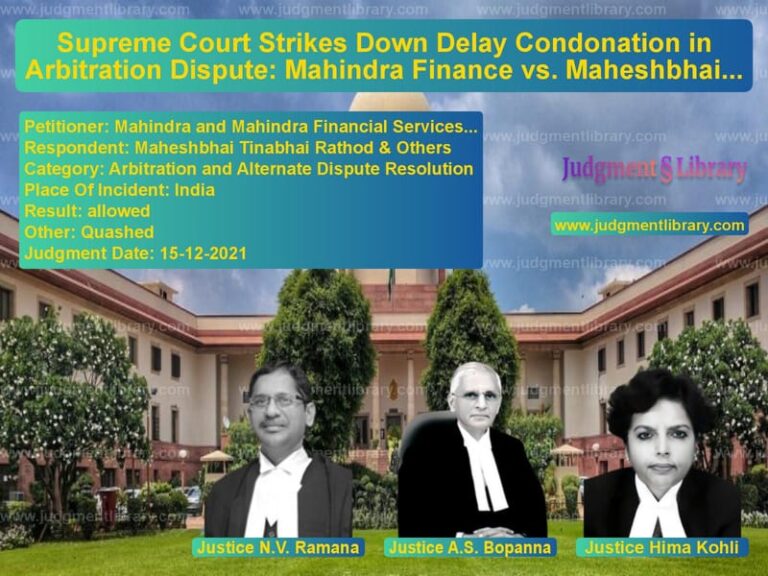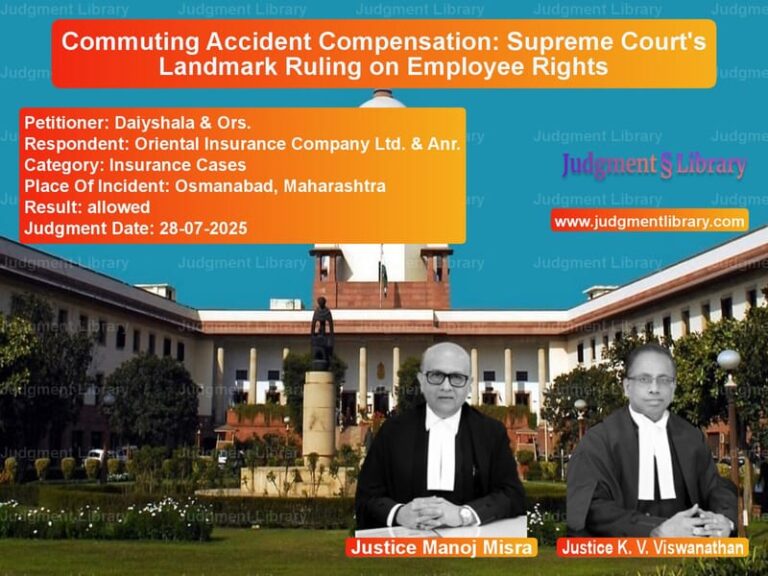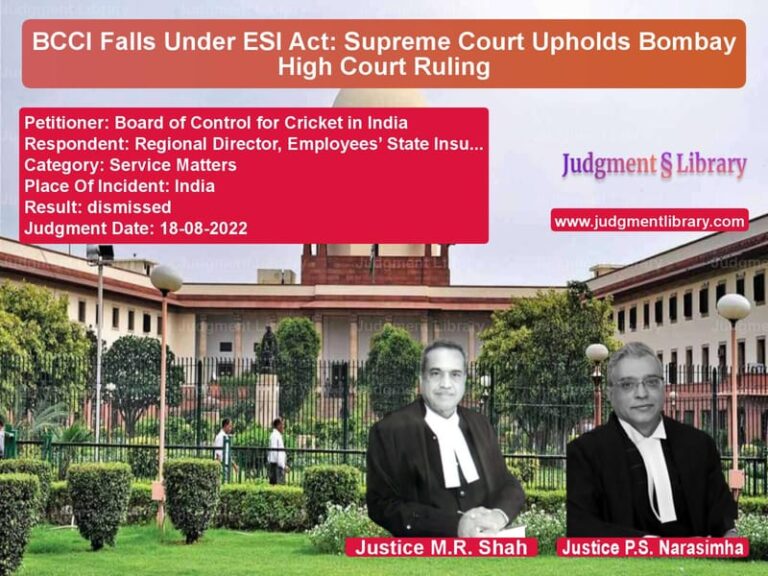Land Allotment Dispute: Supreme Court Upholds Eligibility Criteria for Housing Society
Disputes over land allotment and eligibility criteria are common in housing society cases, especially when government authorities revise policies over time. The case of S.V. Asgaonkar & Ors. vs. The Mumbai Metropolitan Region Development Authority & Ors. dealt with the eligibility of retired employees for land allotment in a cooperative housing society. The Supreme Court, in its judgment dated April 9, 2018, upheld the eligibility criteria established by the Mumbai Metropolitan Region Development Authority (MMRDA) and dismissed the appellants’ claim.
This ruling is significant because it reinforces the validity of government regulations in land allotment and highlights the importance of policy continuity in urban planning.
Background of the Case
The case pertained to a land allotment dispute between former employees of the MMRDA and the authority itself. The MMRDA had passed a resolution on June 7, 1997, to allot a plot of land measuring 13,700 sq. meters in Chitalsar Manpada, Thane, to a cooperative housing society formed by its employees. The land was to be leased for 80 years at a premium rate of Rs. 1400 per sq. meter.
The cooperative society was registered on June 25, 1999. However, a series of correspondences followed, with the society requesting modifications, including payment in installments and adjustments in the land cost. In response, the Government of Maharashtra issued a resolution on July 9, 1999, stipulating new eligibility conditions.
By the time the final allotment was made on September 1, 2003, the policy had changed, and only employees who were still in service on the date of the Letter of Intent (December 11, 2003) were considered eligible. Since the appellants had retired by then, they were deemed ineligible for allotment.
Legal Issues Considered
The Supreme Court considered the following legal questions:
- Whether the eligibility criteria should be based on the original resolution (1997) or the revised allotment policy (2003).
- Whether retired employees could claim vested rights based on the 1997 resolution.
- Whether the allotment process was legally valid and complied with MMRDA regulations.
Arguments by Both Parties
Petitioner’s Argument (S.V. Asgaonkar & Ors.):
- The allotment was initially approved in 1997 when the petitioners were still in service.
- The revised eligibility criteria unfairly excluded retired employees.
- The change in policy was arbitrary and discriminatory.
- The petitioners should be granted the same benefits as MMRDA’s Class-IV employees, who were allotted land under different terms.
Respondent’s Argument (MMRDA & Government of Maharashtra):
- The original resolution (1997) had lapsed due to non-payment by the society.
- The final allotment in 2003 was based on the new government policy (1999 resolution), which clearly stated that only current employees could be eligible.
- The housing society had voluntarily accepted the new terms in its correspondences.
- Granting allotments to retired employees would contradict the approved government policy.
Supreme Court’s Observations
The Supreme Court, comprising Justices A.K. Sikri and Ashok Bhushan, ruled in favor of the MMRDA and upheld the eligibility conditions set in the 2003 allotment.
Key Excerpt from the Supreme Court Judgment:
“The original resolution dated 07.06.1997 itself was not honored by the Society and it lapsed as per statutory Regulations. The allotment dated 01.09.2003 was on the basis of a fresh proposal relying on the Government of Maharashtra Resolution dated 09.07.1999.”
The Court further clarified:
“The Society itself has requested for a fresh consideration and fresh Resolution on the basis of the eligibility laid down by Resolution 09.07.1999.”
Final Verdict
The Supreme Court ruled:
- The revised eligibility criteria set in 2003 were legally valid.
- The retired employees had no vested right to claim land under the 1997 resolution.
- The petitioners’ claims were dismissed.
- No relief was granted, and the MMRDA’s decision was upheld.
Impact of the Judgment
This ruling has significant implications for land allotment policies:
- It reaffirms that policy changes by government authorities are legally binding unless explicitly challenged.
- It ensures that land allotment follows clear eligibility criteria to prevent disputes.
- It highlights the importance of compliance with urban planning regulations.
- It prevents retrospective claims by individuals who do not meet the updated eligibility standards.
Conclusion
This judgment sets a crucial precedent in land allotment cases by affirming that eligibility criteria must be followed as per the latest policy decisions. The Supreme Court’s ruling reinforces the authority of government bodies in framing regulations and ensures that land allocation remains a transparent and rule-based process.
By dismissing the claims of retired employees, the Court has also upheld the principle that policy benefits cannot be extended indefinitely to individuals beyond the specified eligibility date. The decision safeguards urban planning integrity and provides clarity for future land allotment disputes.
Petitioner Name: S.V. Asgaonkar & Ors..Respondent Name: The Mumbai Metropolitan Region Development Authority & Ors..Judgment By: Justice A.K. Sikri, Justice Ashok Bhushan.Place Of Incident: Mumbai, Maharashtra.Judgment Date: 09-04-2018.
Don’t miss out on the full details! Download the complete judgment in PDF format below and gain valuable insights instantly!
Download Judgment: S.V. Asgaonkar & Ors vs The Mumbai Metropoli Supreme Court of India Judgment Dated 09-04-2018.pdf
Direct Downlaod Judgment: Direct downlaod this Judgment
See all petitions in Property Disputes
See all petitions in Succession and Wills
See all petitions in Landlord-Tenant Disputes
See all petitions in Judgment by A.K. Sikri
See all petitions in Judgment by Ashok Bhushan
See all petitions in dismissed
See all petitions in Declared Infructuous
See all petitions in supreme court of India judgments April 2018
See all petitions in 2018 judgments
See all posts in Civil Cases Category
See all allowed petitions in Civil Cases Category
See all Dismissed petitions in Civil Cases Category
See all partially allowed petitions in Civil Cases Category

